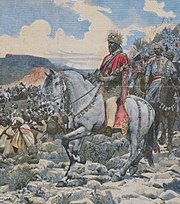History of Africa
The history of Africa begins with the emergence of hominids, archaic humans and — around 300,000–250,000 years ago — anatomically modern humans (Homo sapiens), in East Africa, and continues unbroken into the present as a patchwork of diverse and politically developing nation states.[1] The earliest known recorded history arose in Ancient Egypt,[2] and later in Nubia, the Horn of Africa, the Maghreb, and the western Sahel.[3] Contemporary political map of Africa (Includes Sub-Saharan Africa and North Africa)
Contemporary political map of Africa (Includes Sub-Saharan Africa and North Africa) Map showing the states, people, and material cultures of the African continent c. 1800 BC, but missing the Kintampo civilisation and Tichitt culture in West Africa.
Map showing the states, people, and material cultures of the African continent c. 1800 BC, but missing the Kintampo civilisation and Tichitt culture in West Africa.
 Ethiopian king Menelik II at the Battle of Adwa in 1896
Ethiopian king Menelik II at the Battle of Adwa in 1896
Following the desertification of the Sahara, North African history became entwined with the Middle East and Southern Europe while the Bantu expansion swept from modern day Cameroon (Central West Africa) across much of the sub-Saharan continent in waves between around 1000 BC and 1 AD, creating a linguistic commonality across much of the central and Southern continent.[4]
Many kingdoms have formed and existed throughout African history, with some notable states including:
- North Africa: Ancient Egypt, Kushite Empire, Ancient Carthage, Makuria, Fatimid Caliphate, Almoravid dynasty, Hafsid dynasty, Kingdom of Tlemcen, Ayyubid dynasty, Mamluk Sultanate, Saadi dynasty, Funj Sultanate, and the Alaouite dynasty.
- East Africa: Land of Punt, D'mt, Kingdom of Aksum, Azania, Zanj Empire, Empire of Kitara, Zagwe dynasty, Ethiopian Empire, Kilwa Sultanate, Ifat Sultanate, Adal Sultanate, Ajuran Sultanate, Buganda, Rwanda, Burundi, Busoga, Nkore, and the Kingdom of Imerina.
- West Africa: Ghana Empire, Gao Empire, Kingdom of Nri, Kingdom of Kano, Oyo Empire, Wagadugu Kingdom, Mali Empire, Jolof Empire, Songhai Empire, Kaabu Empire, Kingdom of Bissau, Kingdom of Dahomey, Ashanti Empire, Bamana Empire, Sokoto Caliphate, and the Toucouleur Empire.
- Central Africa: Kanem Empire, Kingdom of Kongo, Wadai Empire, Sultanate of Bagirmi, Luba Empire, Bailundo, Kotoko Kingdom, Kasanje Kingdom, Kuba Kingdom, Kingdom of Lunda, Kazembe Kingdom, Bangassou Sultanate, Dar al Kuti, and the Sultanate of Utetera.
- Southern Africa: Kingdom of Mapungubwe, Kingdom of Zimbabwe, Mpondo Kingdom, Xhosa Kingdom, Empire of Mutapa, Empire of Maravi, Uukwanyama, Rozvi Empire, Kingdom of Swaziland, Mthethwa Empire, Lozi Kingdom, Zulu Kingdom, Kingdom of Lesotho, Gaza Empire, and the Kingdom of Mthwakazi.
Some societies maintained an egalitarian way of life without hierarchy, such as the Jola or Hadza peoples, whilst others did not organise and centralise further into complex societies, such as the Boorana and the chiefdoms of Sierra Leone, and are rarely discussed in political history. At its peak, prior to European colonialism, it is estimated that Africa had up to 10,000 different states and autonomous groups having distinct languages and customs, with most following African traditional religions.[5][6]
From the 7th century AD, Islam spread west from Arabia via conquest, intent on spreading monotheism, and via proselytization, mainly through Faqirs, to North Africa and the Horn of Africa, and later southwards to the Swahili coast, then from the Maghreb traversing the Sahara into West Africa, catalysed by the Fulani Jihad in the 18th and 19th centuries.
Slavery in Africa has historically been widespread and systems of servitude and slavery were common in parts of Africa in ancient times, as they were in much of the ancient world.[7] When the trans-Saharan, Red Sea, Indian Ocean and Atlantic slave trades began, many of the pre-existing local African slave systems started supplying captives for slave markets outside Africa.[8][9] The Atlantic slave trade was the most exploited of these, and between 1450 and 1900 transported upwards of 12 million enslaved people overseas in terrible conditions with many dying on the journey.[10][11]: 194
From 1870 to 1914, driven by the Second Industrial Revolution and its rapacity, European colonization of Africa developed rapidly from 10% of the continent being under European imperial control to over 90% in the Scramble for Africa, leading to the 1884 Berlin Conference in which the major European powers partitioned the continent. [12][13] European rule had significant impacts on Africa's societies and the suppression of communal autonomy disrupted local customary practices and caused the irreversible transformation of Africa's socioeconomic systems.[14] Whilst there were some Christian states in Africa preceding the colonial period, such as Ethiopia and Kongo, widespread conversion occurred under European rule due to efficacious missions, particularly in southern West Africa, Central Africa, and Southern Africa, with peoples syncretising Christianity with their local beliefs.[15]
Following struggles for independence in many parts of the continent, with a weakened Europe after the Second World War (1939–1945), waves of decolonisation took place across the continent, culminating in the 1960 Year of Africa and the establishment of the Organisation of African Unity in 1963, the predecessor to the African Union.[16]
In Sub-Saharan African societies, history generally used to be recorded orally despite most societies having developed a writing script, leading to them being termed "oral civilisations" in contrast to "literate civilisations".[17] Disciplines such as recording of oral tradition, historical linguistics, archaeology, and genetics have been vital in rediscovering the great African civilisations of antiquity, as well as documenting those of later periods.









































